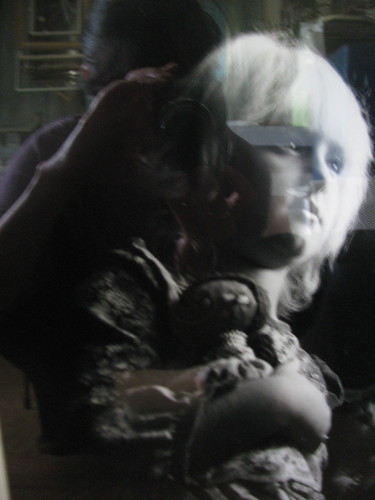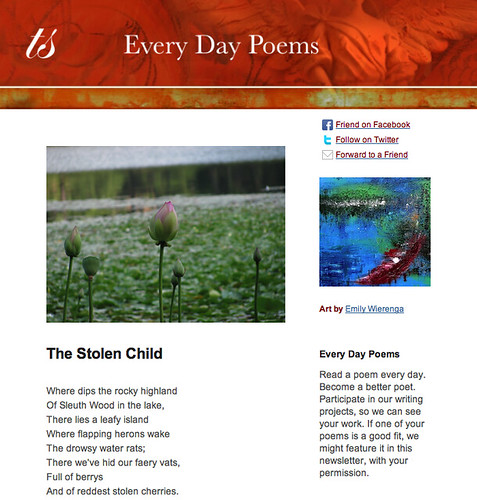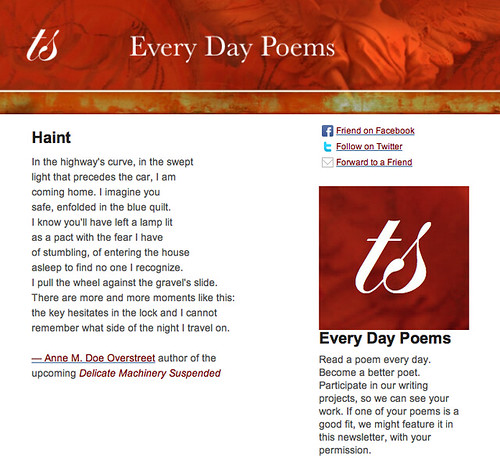It is a book on writing. But it is also more. Somebody said that somewhere. I think it may have been Deidra Riggs.
She is right. There are probably a few “mores” that Rumors of Water: Thoughts on Creativity & Writing is about. But one that compelled me with an odd urgency was this: trying to deal with coming-of-age.
The struggle to grow up, to find one’s place in a world that has both beauty and suffering, is something I deal with a lot at my house. On the one hand, my Eldest is always telling me, “I don’t want to grow up.” On the other hand, my Littlest is always asking me, “What’s it like to be a grown-up?”
So for my Eldest I am always trying to coax her into courage, and for my Youngest I am always trying to hold her back, if only a little.
My dual nature is best captured in a poem I ran the other day in Every Day Poems: The Stolen Child. (The excerpt of the poem, below, is also fittingly the epigraph for Rumors of Water.)
Now I put it out here for you. Can you see how the poem embodies a struggle to grow up? Can you see how a parent might play either role: the faeries or the oatmeal chest? The poem is also, in its way, about Imagination versus Reality. Interestingly, they share certain qualities, both inspiring and frightening.
How about you? What does The Stolen Child evoke? Something more?
The Stolen Child
Where dips the rocky highland
Of Sleuth Wood in the lake,
There lies a leafy island
Where flapping herons wake
The drowsy water-rats;
There we’ve hid our faery vats,
Full of berrys
And of reddest stolen cherries.
Come away, O human child!
To the waters and the wild
With a faery, hand in hand,
For the world’s more full of weeping than you can understand.
Read the rest of The Stolen Child
Post by L.L. Barkat. Visit L.L. at Seedlings in Stone, for more on writing, poetry, art and life.
Subscribe to Every Day Poems— Read a poem a day, become a better poet. In September we’re exploring the question “What is Poetry?”
- Learning by Poetry: Pas du Tout - October 8, 2025
- Found in Translation: Gently May It Sing - September 15, 2025
- Learning by Poetry: Vous venez d’où? - September 1, 2025



Maureen Doallas says
Re-reading this poem now, after having read Rumors of Water, I’m struck by how necessary the beauty of our imaginations is. Also by just how extraordinary your unschooling of your daughters is. It’s the rare person who not only understands the need to have a place, both physical and mental, where the body can dance and hands mingle and the mind find respite from all that we never can prepare for, but also create the conditions for experiencing it. Given the context of your book, this is a marvelous epigraph. It is the thing that saves us.
L. L. Barkat says
Maureen, I love the interplay in this poem between beauty and fear. We can never be exempt from fear in this world, as it is, but we can encounter fear with beauty at our sides. Thank you for seeing that what I’ve tried to do with my girls is give them a way to cultivate and call forth beauty.
The interesting thing in the poem is that the faerys seem to promise beauty and Imagination minus any dread, yet the “unquiet dreams” and the weeping ferns suggest their promise is not all it seems to be. Still, the unwise child follows them without question.
Today I was thinking that this poem also reminds me of the chapter in Rumors called “Alternating Realities.” The more I comb through Rumors, yes, the more I see how this poem was just below the surface all the way through 🙂
Deidra says
I had to go back to see what I said. 🙂
“L.L. Barkat’s Rumors of Water is about creativity and writing and way more than that. It is lovely.”
Yep. I was right. It’s beautiful.